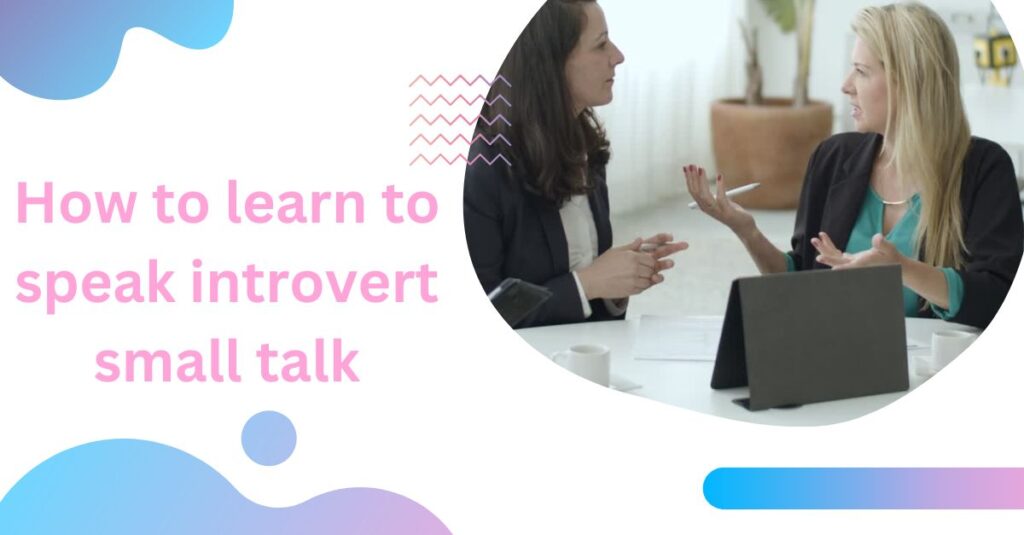we will know in this Article How to learn to speak introvert small talk Small talk is seen as a less hectic way of having social relationships albeit not everyone might be in agreement with this idea. While the former group derives its energy from noisy environments, the latter loves deep dialogue rather than exchanging pleasantries at face value. But you don’t have to drain yourself with the same. There exist more genuine, as well as enjoyable ways of going about the same with intent gaze in contact even if personal details come in too soon!
read here 5 Top strengths of introverts in the workplace

We are knowing here How to learn to speak introvert small talk
This is a guide that can help introverts navigate through small talks, spark up authentic connections and sometimes enjoy the nonsensically low-pressure environment.
also read How to learn to speak introvert small talk
1.Rethink the Meaning of Small Talk
- How to learn to speak introvert small talk
Most introverts believe small talk serves no purpose or is shallow. However, it is essential to redefine this mindset and understand that small talk is not a waste of time but a tool for building relationships. It is a way of starting light conversations before deepening them much later. But remember that small talk is just a means of connection aimed at less comprehension than profound insight.
2.Get Ready For Social Interactions Mentally
If you have social plans, they have to be planned on time even though it should not matter since we will all be Available waiting for you. Do not be too loud or dominate conversations instead keep them in the moment so as make this session realizable by everyone else involved too.
Alter how you think about what you can or cannot do when it comes to socializing because matter of fact small talk has nothing to do with dominance over any kind of talk during conversation neither too much charisma but being present in a mind space where bonding happens at the same time would do for anyone. Setting our goals at an attainable level such as meeting one new person or having ‘one talk’ can also help mitigate distressing thoughts while enhancing a sense of power.
You also have to know when enough is enough with regard to your own energy levels. Therefore, Ensure you know how long you can stay clocking up before needing solitude. Setting boundaries such as having an escape route in case you feel too drained could be instrumental in maintaining mental health care for such high-principled individuals.
3.Active Listening Skills
One excellent way for introverts to great in small talks is by sharpening their listening skills. This enables the majority of information shared during a conversation come from another party without necessarily needing to talk a lot ourselves most of times but rather directing their thoughts down into different lines through questions or comments from time to time. This way, you would be able to communicate with others without talking too much.
Therefore, endeavor to respond with curiosity and deliberate questions for more insight. These are such as; “What possessed you into doing this?” or “From what you do, at what point do you feel like you have worked long enough?” Through this, these inquiries may be considered genuine interest in what the other person says but not an attempt at memorizing every aspect concerning everything that has ever crossed his/ her mind.
By doing so you can demonstrate that you are paying attention using nonverbal cues like nodding your head “yes”- wise when necessary, making eye contacts together with leaning slightly forward sometimes depending on his/her speaking loudness besides maintaining concentration until one hundred percent.
4.Construct Open-Ended Questions
The most admired conversation among introverts is that where they are allowed to ask probing questions in addition to listening. When it comes to small talk, open-ended questions are the best because they promote longer responses thus make discussions more interactive. Instead of saying “Did you have a good weekend?”, try asking “What did you do over the weekend?” or “What’s been the highlight of your week so far?”
These types of questions allow another person to talk about something that concerns him or her which will in turn create an elaborate flow of conversation. Using this approach can help avoid embarrassing pauses and maintain a relaxed atmosphere during the exchange.
5.Keep Responses Short But Meaningful
Being able to talk without dominating a conversation is possible for introverts too. In fact, quiet and profound remarks often become more memorable than lengthy monologues. When you’re asked about what you do for fun at parties don’t feel obligated to list all your hobbies succinct interesting responses over beverage may just suffice. As such the person needs just a little more time rather than a lot of talking about everything in the world”
Also, don’t be afraid to share a little bit about yourself, but do so in moderation. Small, relevant details about your own experiences help build rapport without overwhelming the conversation. This way both of you would feel like active participants.
Value Pauses and Quiet
Silences are not always awkward in their company since introverts tend to favor slower, more reflective conversations where pauses naturally occur although he/she may have talked earlier. Therefore allow for some silence once again rather than trying to speak at all cost. These breaks enable participants think through what has been said thus far during that interaction period.
However, if the silence lasts too long, you can change the subject in a gentle manner or make some kind of joke to break the ice. For example saying “I am very good at making silences “is a nice way of making people laugh after the speaker realizes that he/she has talked too long about the inappropriate topic thus name of national football team they are supporting.
7.Plan an Elegant Exit
To most people mastering the art of saying goodbye can be a herculean task especially when it comes to small talk. In fact introverts do not only feel exhausted after spending much time on social interactions but your own body talks back at times hence there must come forth such signs showing that one should leave them. Instead of feeling bad about taking off early from a discussion try seeing it as setting boundaries with self care in mind
A good way of exiting politely is saying ‘“It was nice talking to you but I have to take care of something else for a while” ’ or “ Oh our conversation was interesting, see you soon”. It is an easy way to go away without feeling uncomfortable or rude.
8.Practice and Reflect
The more you engage in small talk, the simpler it will seem. Train in places where there is less pressure such as by conversing with workmates, neighbors, supermarket cashiers. These events are like rehearsals since they help one practice on the skills so that when they are at bigger events these behaviors become second nature to them. After each conversation take a little while to reflect on what went well and what can be improved upon. It will help you adapt better after some time.
9.Important Instructions:
- 1) Please wait until your request is completed.
- 2) Do not submit more than 1000 words at a time.
- 3) If your input text is large, always break it into chunks of not more than 1000 words and humanize each chunk individually.
- 4) Do not close the window until your request is completed.
- 5) You can save the document once the output is generated.
Conclusion: Practice your introverted talents
we learned in this A How to learn to speak introvert small talk
Introverts need not find small talk exhausting or awkward. It is possible to carry out social interactions that seem authentic and valuable by being an active listener, asking meaningful questions and tapping into your intrinsic strengths. Instead of pretending to be someone else, it means looking for ways to relate with others based on one’s character and strength level.
It won’t be long before you realize that small talk does not have to intimidate you any longer; but that rather it can be used as an avenue into deeper relationships which meet our individual needs.
How do introverts make small talk?
How to learn to speak introvert small talk Introverts can make small talk by asking questions that require more than just a yes or no answer, they offer concise replies on the other hand they listen carefully without interrupting as a result they do not feel compelled to talk all the time.
How to be confident in small talk?
How to learn to speak introvert To gain confidence in chit-chatting, focus on active listening, ask open-ended questions, and welcome pauses hence avoiding rushing to fill them, thus allowing natural conversation to flow.
How can self-talk improve self-confidence?
How to learn to speak introvert small talk Replacing negative thoughts with positive affirmations and empowering beliefs through self-talk can help in building more supportive and resilient mindset, thus improving self-confidence.
